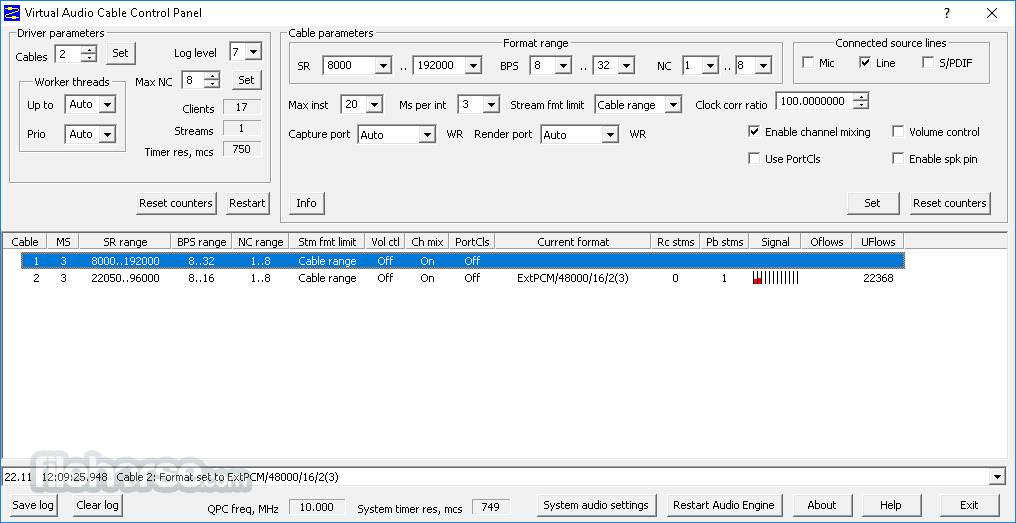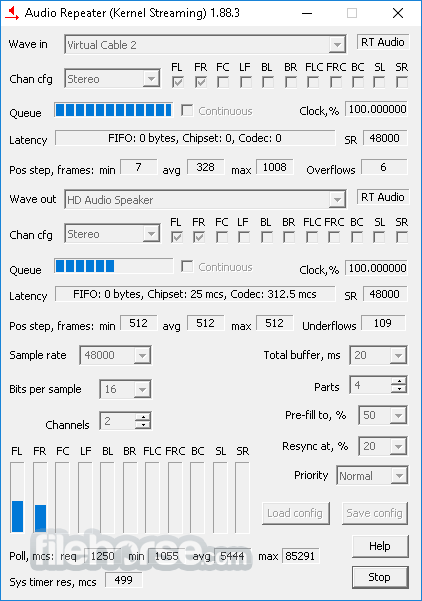-
Latest Version
Virtual Audio Cable 4.7.0 LATEST
-
Review by
-
Operating System
Windows XP / Vista / Windows 7 / Windows 8 / Windows 10 / Windows 11
-
User Rating
Click to vote -
Author / Product
-
Filename
vac470.zip

You definitely know that traditional hardware audio devices (CD/LP player, FM receiver, equalizer tool, amplifier, etc.) may be connected together by electric (analog or digital) cables.
It provides a set of virtual audio devices named Virtual Cables. The "Virtual Cable" term is used only in the VAC description, actual device/endpoint names are different.
You could create the same path, connecting the analog output of any audio adapter (sound card) to its own analog input by a plain electric cable. Then, you can select playback and recording endpoints in source and destination applications, so they become connected to each other.
This software performs such signal transfer completely inside the computer, with no audio hardware, and with no quality loss (if no format conversion and/or volume control are involved).
Download Virtual Audio Cable for Windows PC now!
However, the digital audio signal produced by the source application will come through a digital-to-analog converter, then through the electric cable, then through an analog-to-digital converter, and finally recorded by the destination application.

Therefore, double digital-to-analog and analog-to-digital conversions are performed in case of such connection, and audio quality is degraded.
VAC behavior is similar to the "Stereo Mix" ("What You Hear" or "What U Hear") feature of some hardware audio adapters (cards). But it is only similar, not equivalent.
If you simply need a function like "Stereo Mix" under Win7/Win8/Win10/Win11, there could be better to try to enable it in your audio adapter.
No audio hardware required
You need no audio hardware (sound adapter/card), either built-in or external, to use VAC for digital audio transfer. Audio hardware is required only to hear the results, or to record signals from external sources. On a computer with no audio adapter (card), you still can use VAC to record audio signals produced by applications (for example, testing audio broadcast on a virtual server).
Control panel application
VAC Control Panel application allows you to change the number of Virtual Cables, view/modify VAC driver and cable settings, watch for cable/stream activity.
Device-to-device audio transfer
Virtual Cable devices (endpoints) allow you to organize application-to-application audio transfer only. To perform the endpoint-to-endpoint transfer, use the Audio Repeater application included in the product package.
Driver-based solution
The app contains Windows WDM/KS virtual device driver that creates virtual audio devices. This driver is a kernel-mode module and needs to be installed with administrator rights. Being a WDM/KS filter, it represents the lowest-level audio layer in Windows. It can be effectively used by any upper-level layer (KS-aware applications, WASAPI, MME or DirectSound subsystems, ASIO wrappers, and so on).
Comprehensive user manual
It user manual is included in the free trial package available on the download page. It contains many details useful for a better understanding of the product and using it correctly. You don't have to install the trial version to open and read the user manual. Just download the ZIP archive, open it to see the contents, and double-click on the file named "vac" marked by the question mark icon (the "chm" extension).
Features and Highlights
- Windows 11, 10, 8.1, 8, 7 (32-bit and 64-bit).
- Up to 256 Virtual Cables, allowing to transfer up to 256 independent audio signals at the same time.
- Latency can be reduced down to 0.5 milliseconds.
- Almost any of fixed point PCM audio formats (1000..384000 samples per second, 8..32 bits per sample, 1..32 channels).
- PCM format conversion (sampling rate, bits per sample, number of channels).
- RT Audio (WaveRT) protocol support with notification events, packet mode, clock, and position registers. Clock registers are bound to Virtual Cables so all streams in each cable are coherent.
- An unlimited number of Kernel Streaming clients. You can share each Virtual Cable between any number of KS-aware audio applications or ASIO wrappers.
- Signal mixing from all streams of each Virtual Cable, allowing to mix signals from several applications in real-time.
- Volume control features (both attenuation and boost).
- Channel scattering/gathering mode. Using KS-aware applications, you can map particular channels in a stream.
- High Audio Quality Routing
- Minimal Latency Performance
- Customizable Audio Channels
- Compatible with Most Audio Apps
- Easy Installation Process
- Complex Setup for Beginners
- Limited Free Version Options
- Occasional Audio Lag Issues
- No Built-In Audio Effects
- Resource-Intensive on Low-End PCs
What's new in this version:
Added:
- ARM64 binaries
- client clock adjustment feature to the driver, allowing applications to adjust cable clock on the fly, without changing cable clock correction value permanently
- a workaround for Windows bug that requires to start high-level clients before KS ones
- the name of the process that created the stream to the stream information
- a dynamic cable clock adjustment to Audio Repeater applications
- workaround to Setup application to remove hidden "phantom" device instance if the previous installation was forcibly aborted
- Changed algorithm of actual sampling rate calculation for better reflection of recent changes
- Changed layout of Audio Repeater KS window to fit low-height screens
- Audio Repeater MME now finds the endpoint by name when the transfer is started. It allows to avoid restarting the app if endpoint order was changed (when audio devices are plugged/unplugged, default endpoint is changed etc.).
- Setup application now searches for uninstallers of older versions
- VAC driver API version increased to 6
- Fixed a driver bug that caused render streams to speed up when volume control and/or format conversion are used
- Fixed a driver bug that caused OF/UF values in the stream termination event to always be zero
- Packet mode support is disabled by default to improve stream reliability in typical applications. Packet mode controls added to VAC Control Panel
 OperaOpera 119.0 Build 5497.141 (64-bit)
OperaOpera 119.0 Build 5497.141 (64-bit) SiyanoAVSiyanoAV 2.0
SiyanoAVSiyanoAV 2.0 PhotoshopAdobe Photoshop CC 2025 26.8.1 (64-bit)
PhotoshopAdobe Photoshop CC 2025 26.8.1 (64-bit) BlueStacksBlueStacks 10.42.85.1001
BlueStacksBlueStacks 10.42.85.1001 CapCutCapCut 6.5.0
CapCutCapCut 6.5.0 Premiere ProAdobe Premiere Pro CC 2025 25.3
Premiere ProAdobe Premiere Pro CC 2025 25.3 PC RepairPC Repair Tool 2025
PC RepairPC Repair Tool 2025 Hero WarsHero Wars - Online Action Game
Hero WarsHero Wars - Online Action Game SemrushSemrush - Keyword Research Tool
SemrushSemrush - Keyword Research Tool LockWiperiMyFone LockWiper (Android) 5.7.2
LockWiperiMyFone LockWiper (Android) 5.7.2




Comments and User Reviews